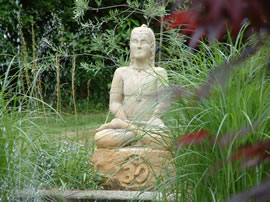Bhagvad Gita – Samadhi of Gita with reference to Chapter VI – Lilly Julier
BHAGVAD GITA
(The Song of the Lord)
(We are continuing the papers written by the TTC students on Bhagvad Gita and seen by our Rev. Swami Gitaprakashananda Ji)
Describe Samadhi of the Gita with reference to Cahpter 6
(Lilly Julier) Samadhi is the highest state of meditation. Chapter 6 gives some guidelines on Samadhi. There are pre-requisites to take into consideration such as, environment, food, behaviour. They all have influence on Samadhi.
To be able to make any progress towards Samadhi, one must make some changes in one’s daily life. One must be moderate in eating, sleeping and drinking otherwise lethargy and laziness will occur.
Sankalpa (selfish motives) must be renounced so that one does not get attached to sense objects and actions. The result of renouncing Sankalpa will give a strong mind and a person can become Sanyasi and practise Yoga. Only a person with a strong mind can meditate (Ch. VI, 2)
As far as the body is concerned one should try to minimise bodily requirements. One should not be a slave of the body but master the body. When one can make proper use of the body and keep it quiet at one’s will, it will lead to meditation,Ch. VI, 10).
One should be in solitude when practising meditation. It is important to keep the place clean and the seat neither too high nor too low. The importance of cleanliness keeps the mind calm. The room should also be simple in its appearance, too many things/objects around does disturb the mind (Ch. VI, 11).
The method for practising meditation is: “Let him hold the body, head and neck erect and still, gazing at the tip of his nose, without looking around. Breathing becomes easy and free in this position and good thoughts come naturally into the mind. Body consciousness disappears and the mind calms down. One will in due course experience bliss with the mind fixed in the Self/Atman , and will lead to Moksha (Ch. VI, 13).
The progress in meditation is obtained when one control desires, senses and temptations of food and other materialistic things. The mind must be disciplined and rest in Self alone. The mind must become onepointedness. The Gita says (Ch. VI, 19) As a lamp in a windless place does not flicker, so the mind should be sheltered from sense objects.
When the highest state of Samadhi is obtained one is not shaken by any afflictions. There is no difference between hot and cold, pain and pleasure. This union is known as Yoga.
When the mind is harmonised by Yoga dualism does not exist. One sees divinity in all living beings.
The mind is difficult to control as it is so very restless, but by practice and non-attachment it can be obtained. One must change old habits to new (spiritual) habits. Practise, practise and practise is the answer.
When I reflect on Chapter VI and relate it to my own life, I can easily see that I have got a lot to work to do.
Last time when we were together, Swami Ji you asked a question – ‘Why is there no change in us’, the answer is: Because we do not change anything in ourselves.
I must try to make some changes in my life. I still have not the proper control over my body and wandering mind. I do get tempted with too much delicious food and my desires and senses are not under control as yet.
What I find very, very difficult is my flickering mind. When I sit for pranayama and meditation, most days mymind is completely out of control. There are so many disturbing thoughts. Now and again I do experience peace in glimpses. It is a wonderful experience.
I do need to work hard on changing my attitude in my daily life. I must try hard to meet people with understanding and love, put away my ego, and not get irritated and judging when I meet people that do not respond to my wishes.
I must overcome my weaknesses and work hard so that I become stronger one day to resist the temptations around me. As Chapter VI tells when the Sankalpas are renounced, the mind becomes stronger. I will always remember Indar Ji’s words:
Practice Patience Perseverance
——————————————————–
Commentary by Swami Chidbhavananda Ji
On B.G., Ch6, v. 1.
People in general have a misconception about sanyasa. That the Sanyasin should not shoulder any responsibility and that he should be a drone, is the prevalent notion. Lighting fire is a symbol of performing Yajna. The general wrong belief is that the Sanyasin is not to do any altruistic work. Arjuna’s plea that he would not engage himself in the impending war and that he would beat a retreat and live on holy alms, is an example of this wrong idea. But the Lord’s contention is different. What He upholds is the true practice of Vedanta. No person should ever discard action. Each has his duty and it has to be well executed. Among the doers of duty, he is a Sanyasin, he is a yogi, who discharges duty for duty’s sake and in no way attached to the fruits of his action. Because of the renunciation of attachment to work and its effect, he is a Sanyasin and because of his doing the duty very efficiently he is a karma yogi.
